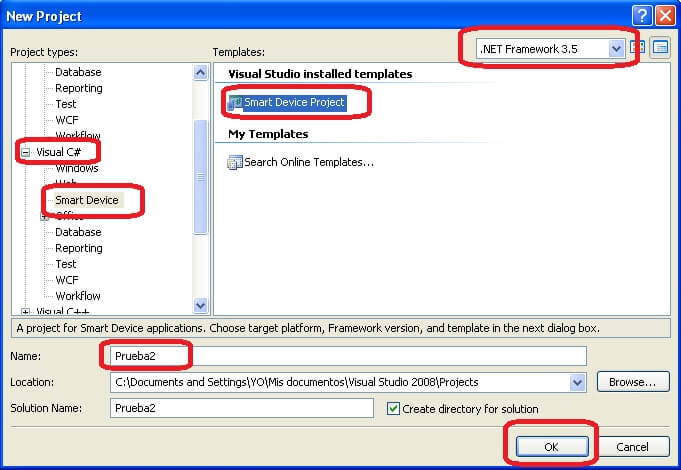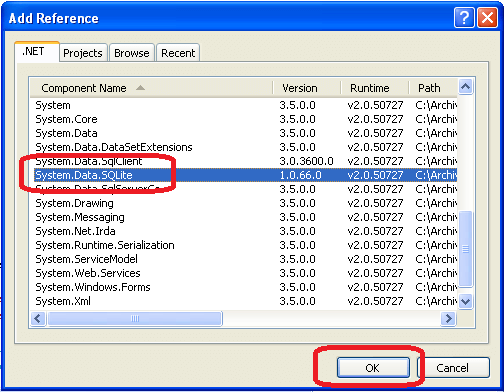Visual Studio 2008 – Windows Embedded con SQLite

Realice la configuración en una maquina virtual con Windows XP creada con VirtualBox (https://www.virtualbox.org/)
En la maquina virtual instalé:
1.- Visual Studio 2005 o 2008
2.- Windows Mobile 6 Professional SDK Refresh (https://www.microsoft.com/en-us/download/details.aspx?id=6135)
3.- Windows Mobile 6.5.3 Professional DTK (https://www.microsoft.com/en-us/download/details.aspx?id=5389)
4.- SQLite 1.0.66.0 (https://sourceforge.net/projects/sqlite-dotnet2/files/SQLite%20for%20ADO.NET%202.0/1.0.66.0/)
5.- Microsoft ActiveSync version 4.5 (https://www.microsoft.com/es-cl/download/details.aspx?id=15)
Crear un nuevo proyecto en visual studio 2005 o 2008 y seleccionar “Visual C#” -> “Smart Device” -> “Smart Device Project”:

Luego referenciar la librería de SQLite, boton derecho sobre el proyecto -> “Add Reference”, en la viñeta “.NET” hacer doble click en “System.Data.SQLite”:

Crear una base de datos SQLite con “sqliteadmin” (https://sqliteadmin.orbmu2k.de/), acá dejo la base que utilice para esta prueba bajar aquí:
Agrear la base de datos al proyecto.
En el formulario agregar un “button” y un “label” y en el código escribir lo siguiente:
[vbnet]
using System;
using System.Linq;
using System.Collections.Generic;
using System.ComponentModel;
using System.Data;
using System.Drawing;
using System.Text;
using System.Windows.Forms;
using System.Data.SQLite;
namespace Prueba2
{
public partial class Form1 : Form
{
public Form1()
{
InitializeComponent();
}
private void button1_Click(object sender, EventArgs e)
{
string query = "SELECT * FROM test";
string conString = "Data Source = \Program Files\Data\test.s3db";
SQLiteConnection con = new SQLiteConnection(conString);
SQLiteCommand cmd = new SQLiteCommand(query, con);
con.Open();
try
{
SQLiteDataReader rdr = cmd.ExecuteReader();
try
{
while (rdr.Read())
{
this.label1.Text += string.Format("\r\nID:{0} Nombre: {1}", rdr[0].ToString(), rdr[1].ToString());
}
}catch(Exception ex){
MessageBox.Show(ex.Message);
}
}catch(Exception exc){
MessageBox.Show(exc.Message);
}
}
}
}
[/vbnet]


